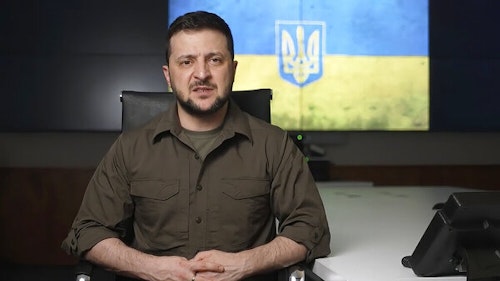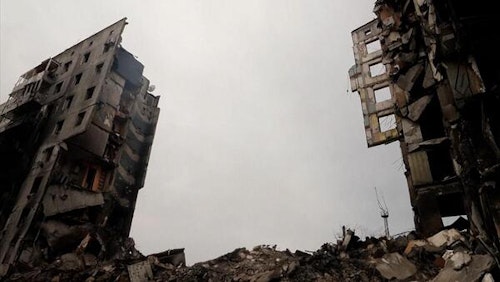The Ukrainian president says any future tribunal must hold Russia accountable for the attack on Kramatorsk train station, mass killings in Bucha, and other atrocities.
The war in Ukraine is now well into its sixth week, and taking on a new dimension with growing evidence of human rights atrocities by Russian troops as they retreated from the Kyiv region and other parts of the north.
Despite Moscow's blanket denials, horrific discoveries of civilian murders and other barbaric acts are coming to light.
As Vladimir Putin's forces concentrate their offensive on eastern Ukraine, NATO and the EU have promised Kyiv more weapons, and Western nations are tightening sanctions against Moscow.
Follow the updates from Saturday as they unfolded in our blog below, and watch the latest live TV coverage in the video player above.

 ${title}
${title}
Live ended
Saturday's key points:
- Ukrainian President Volodymyr Zelenskyy says he wants a tough global response to Russia after its forces fired a missile at a crowded train station, killing at least 52 people in Kramatorsk.
- British Prime Minister Boris Johnson and Austrian Chancellor Nehammer both visited Ukraine on Saturday. Johnson promised more military hardware; Nehammer said Austrian diplomats would return to Kyiv.
- An international fundraising effort called "Stand Up for Ukraine" lead by the EU and Canada has raised €10.1 billion.
- Ten humanitarian corridors have been opened in the Donbas region on Saturday to let civilians leave the area ahead of an expected major Russian military offensive.
- Britain's Ministry of Defence says Russian naval vessels have continued firing cruise missile's into Ukraine's Donbas region, and continues to hit non-combatants too.
- US officials say the Pentagon has determined that some of the Russian combat units that retreated from the Kyiv area in recent days are so heavily damaged and depleted that their combat utility is in question.
- Visiting Kyiv on Friday, European Commission President Ursula von der Leyen handed over a questionnaire that could kickstart his country's membership in the bloc.
- The leader of Poland's ruling conservative party Jaroslaw Kaczyński has criticised his ally, Hungarian nationalist Prime Minister Viktor Orbán over his refusal to condemn Vladimir Putin for the invasion of Ukraine.
Search for bodies in Borodyanka
Firefighters searched for bodies in the debris of destroyed buildings in a town near Kyiv, which had been targeted by Russian airstrikes during its invasion of Ukraine.
Using heavy machinery the emergency services sifted through the rubble of buildings and among burned-out cars looking for missing residents of Borodyanka.
The town had been severely damaged when it was bombarded by a wave of missiles in March.
(Euronews)
Austria plans to send diplomats back to Kyiv
Austrian diplomats, evacuated from Kyiv to an outpost in the far west of Ukraine before the start of the war, will soon return to the capital city.
Chancellor Karl Nehammer made the announcement on a trip to Ukraine on Saturday, where he met President Zelenskyy.
Staff have been working in the western city of Uzhhorod near the border with Slovakia.
“Since the situation around Kyiv has now stabilized somewhat, the Austrian embassy’s team will resume its work in the Ukrainian capital” said Nehammer, adding that it was a sign of Austria’s “full support for Ukraine at this very difficult time.”
The European Union also has returned its ambassador to Kyiv and Italy also reportedly plans to reopen its embassy there.
(AP)
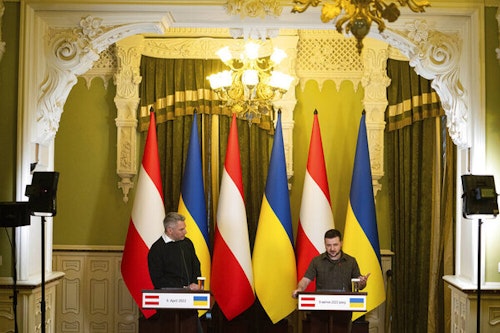
Germany 'has almost reached a limit' on weapons it can send to Ukraine
Germany has almost exhausted its options for sending military equipment to Ukraine drawn from its own stores.
However the German army, the Bundeswehr, is working to make deliveries directly from the arms industry according to Minister of Defence Christine Lambrecht.
“For deliveries from Bundeswehr stocks, I must honestly say that we have reached a limit in the meantime,” the minister told the Augsburger Allgemeine newspaper on Saturday.
The German army must maintain its capacity for action and be able to "guarantee the defense of the country and of the Atlantic Alliance" (NATO), she added.
"But that doesn't mean we can't do more for Ukraine, so we've clarified what industry can provide directly" in Kyiv, Lambrecht continues.
Until the Russian invasion on 24 February, Germany was reluctant, for historical reasons, to send arms to Ukraine, which demanded them in the face of rising tensions with Moscow.
Chancellor Olaf Scholz then made a U-turn and Ukrainian forces have already received anti-tank weapons, missile launchers and surface-to-air missiles from Berlin.
But the conflict in Ukraine has also cast a harsh light on the "alarming" state of the Bundeswehr, according to Bundestag defense commissioner Eva Högl, while one of the top brass spoke of a army "more or less dry".
(AFP)
German demonstrators stage 'die-in'
Several hundred people in Hamburg staged a 'die-in' against Russia's war in Ukraine on Saturday.
Some of the demonstrators re-enacted gruesome images of civilians killed in the Kyiv suburbs of Bucha, Irpin and Hostomel.
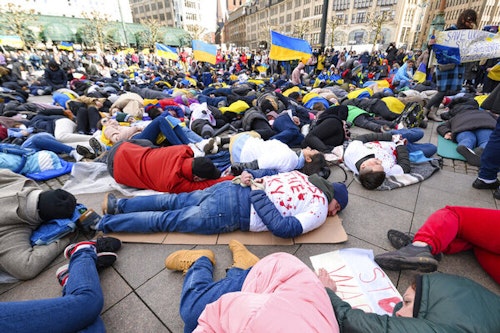
Ukraine fundraising event nets more than 10 billion euros
An international fundraising event has generated €10.1 billion to support Ukraine, European Commission President Ursula von der Leyen announced on Saturday in Warsaw.
The event, called 'Stand Up For Ukraine' raised €9.1 billion while the Commission and European Bank for Reconstruction and Development EBRD is adding another billion euros for a total of €10.1 billion.
Von der Leyen was joined at the event by Polish President Andrzej Duda and -- remotely -- by Canadian Prime Minister Justin Trudeau and Ukrainian President Volodymyr Zelenskyy.
Saturday’s pledging event was held in Warsaw because more than 2.5 million of the 4.4 million people who have fled Ukraine since Russia’s invasion began entered Poland. Many have stayed though some have moved on to other countries.
Convened jointly by von der Leyen and Trudeau, it was meant to prompt political leaders and global celebrities to provide funding and other donations for the people of Ukraine.
(AFP, AP)
Boris Johnson in Ukraine for talks with Zelenskyy
UK Prime Minister Boris Johnson has traveled to Ukraine on Saturday to meet with President Volodymyr Zelenskyy in show of solidarity.
The two leaders will discuss the “UK’s long term support to Ukraine’’ including a new package of financial and military aid, the prime minister's office said.
The visit comes a day after Johnson pledged another 100 million pounds (€120 million) in high grade military equipment to Ukraine, saying Britain wants to help Ukraine defend itself from continuing Russian assaults.
The deputy head of the Ukrainian presidential office, Andrij Sybiha, said the two leaders are meeting in Kyiv.
Speaking Friday at a news conference with German Chancellor Olaf Scholz, Johnson said he would give Ukraine’s military more Starstreak anti-aircraft missiles, another 800 anti-tank missiles and precision munitions capable of lingering in the sky until directed to their target.
He also promised more helmets, night vision and body armor. The items were in addition to some 200,000 pieces of non-lethal military equipment from the UK that had already been promised.
(AP)
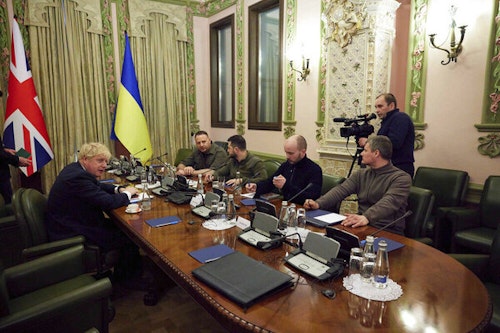
Ten humanitarian corridors to open on Saturday
Ten humanitarian corridors for civilian evacuations are to open in Ukraine’s east on Saturday, according to Ukraine’s Deputy Prime Minister Iryna Vereshchuk.
The corridors will allow residents to leave a number cities in the regions of Donetsk, Luhansk and Zaporizhzhia.
Those in Mariupol, Enerhodar, Tokmak, Berdyansk and Melitopol will be able to evacuate to the city of Zaporizhzhia, while those in Severodonetsk, Lysychansk, Popasna, Girske and Rubizhne can evacuate to the city of Bakhmut in the Donetsk region.
(AP)
Ukraine is "always ready" to hold talks with Russia
Ukraine is "always ready" to hold talks with Russia, says President Zelenskyy, even after talks were stalled after the discovery of atrocities in liberated Ukrainian cities.
Zelenskyy made the comments on Saturday during a visit by Austrian Chancellor Karl Nehammer to Kyiv and Bucha.
"We are ready to fight and at the same time seek diplomatic ways to stop this war. For the moment, we are considering a parallel dialogue," he said.
Meanwhile Austria’s leader says he expects more European Union sanctions against Russia but is defending his country’s opposition so far to cutting off deliveries of Russian gas.
At a press conference, Nehammer told journalists that Austria will "continue to ratchet up sanctions inside the European Union until the war stops” and that a package of sanctions imposed this week “won’t be the last one.”
He acknowledged that “as long as people are dying, every sanction is still insufficient.”
Austria, which gets most of its gas from Russia, is one of the countries that have been resisting a halt to deliveries. Questioned about that Saturday, Nehammer said that EU sanctions are becoming increasingly “accurate” but that “sanctions are effective when they hit those they are directed against, and don’t weaken those imposing sanctions against the one who is conducting war.”
Austria is militarily neutral and not a member of NATO.
(AFP, AP)
Odesa curfew announced
Authorities in the Ukrainian city of Odesa have announced a curfew which comes into effect on Saturday evening and lasts through until Monday morning.
It comes after Friday's strike on Kramatorsk train station, with officials saying that "a threat of missile attack hovers over Odesa" too.
"Due to the possibility of a missile attack on Odessa, based on my order, on the territory of the city and Odesa region, a curfew was introduced from 2100 9th April to 0600 April 11th" says Maksym Marchenko, the Governor of Odesa district.
(AP, AFP)
UN: More than 4.4 million Ukrainian refugees
The United Nations High Commission for Refugees says more than 4.4 million Ukrainians have fled their country since the start of the Russian invasion on 24 February.
On Saturday UNHCR said that it had registered 4,441,663 Ukrainian refugees.
That number is 59,347 more than during the previous tally on Friday.
Some 90% of those who fled Ukraine are women and children, with Ukrainian authorities not allowing men of military age to leave.
According to the UN's International Organization for Migration (IOM), around 210,000 non-Ukrainians have also fled the country, sometimes encountering difficulties in returning to their country of origin.
The UN also estimates the number of internally displaced people at 7.1 million, according to IOM figures released on 5 April.
In total, therefore, more than 11 million people, or more than a quarter of the population, have had to leave their homes either by crossing the border to reach neighboring countries, or by finding refuge elsewhere in Ukraine.
(AFP)
Moscow accuses YouTube of blocking parliament channel
Russian officials on Saturday accused Youtube, owned by US giant Google, of suspending the account of the Russian parliamentary channel, promising retaliation that raised fears of a blockage of the service in Russia.
Duma Speaker Vyacheslav Volodin claimed that the Russian parliament's lower house Youtube channel, "Duma-TV", had been blocked, denouncing a Washington measure violating "the rights" of Russians.
"The United States wants to have a monopoly on the dissemination of information," he said on his Telegram account. "We cannot allow this."
Journalists in Moscow found that the account in question was no longer accessible on the platform on Saturday morning, with or without a virtual private network (VPN), a tool which makes it possible to avoid blocks.
According to Moscow, the "Duma-TV" account has more than 145,000 subscribers on Youtube. It broadcasts excerpts from parliamentary exchanges, interviews with Russian MPs and live broadcasts.
In recent weeks, in the midst of the conflict in Ukraine, Youtube has already been accused several times by Moscow of having blocked the accounts of Russian media and officials.
(AFP)
Ukraine has 'intercepted evidence of Russian war crimes'
Ukrainian President Volodymyr Zelenskyy said his country’s security service has intercepted communications of Russian troops that provide evidence of war crimes.
“There are soldiers talking with their parents about what they stole and who they abducted. There are recordings of prisoners of war who admitted killing people,” Zelenskyy said in an excerpt of an interview with CBS’ “60 Minutes” that aired Friday.
“There are pilots in prison who had maps with civilian targets to bomb. There are also investigations being conducted based on the remains of the dead,” he said in a translation provided by CBS.
Zelenskyy said “everyone who made a decision, who issued an order, who fulfilled an order” is guilty of a war crime. Asked whether he held Russian President Vladimir Putin responsible, he said: “I do believe that he’s one of them.”
(AP)
Serbia claims NATO 'endangers lives of passengers' for shadowing airline
The government of Serbia wants NATO to explain why its jets have allegedly shadowed Serbian passenger planes flying back from Russia.
Serbian officials said that on Wednesday a NATO jet flew close to an Air Serbia flight from Moscow to the Serbian capital, Belgrade, near the Latvian border.
A similar incident was reported by Serbian media on Friday when reportedly a NATO Belgian Air Force fighter jet “escorted” another Air Serbia plane flying from St. Petersburg to Belgrade.
Serbian President Aleksandar Vucic has said such actions “endanger civil aviation and lives of passengers.”
Besides Turkish carriers, Air Serbia remains the only European airline to maintain its regular flights to Russia after an international flight ban was imposed.
Serbia has voted in favor of UN resolutions condemning the Russian invasion of Ukraine but has refused to join international sanctions against its ally Moscow.
(AP)
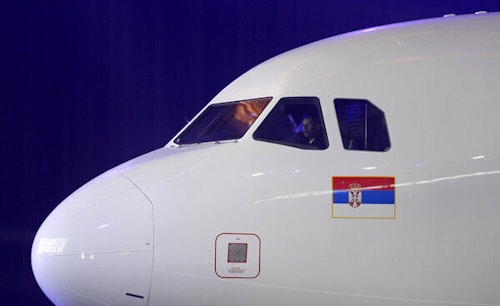
British MoD: Russia firing cruise missiles into Donbas
The British Ministry of Defence says that Russian naval forces have been firing cruise missiles into Ukrain, targeting the Donbas region cities of Mariupol and Mykolaiv.
The latest assessment, published on Saturday morning, also says Russia "continues to hit Ukrainian non-combatants, such as those killed in yesterday's rocket strike on Kramatorsk railway station in eastern Ukraine."
The MoD says Russian air activity is expected to increase in the south and east of Ukraine as Russian forces concentrate their efforts on combat in the Donbas area.
Russian combat units 'heavily damaged and depleted'
A senior American defense official says the Pentagon has determined that some of the Russian combat units that retreated from the Kyiv area in recent days are so heavily damaged and depleted that their combat utility is in question.
The official described these units as “for all intents and purposes eradicated,” with only a small number of functioning troops and weapons remaining. The official, who spoke on condition of anonymity to discuss internal US military assessments, did not say how many units sustained such extensive damage.
The official said some combat units that withdrew from the Kyiv area are beginning to move toward the Russian towns of Belgorod and Valuyki for refitting and resupplying before likely deploying to the Donbas region of Ukraine. The official also said the US has seen thousands of additional Russian troops added to the combat force that Moscow has been using in and around the Ukrainian city of Kharkiv.
The official says that the US believes Russia has lost 15 to 20 percent of the combat power it had assembled along Ukraine’s borders before launching its invasion on 24 February.
(AP)
President Zelenskyy demands tough global response for Russian attacks
Ukrainian President Volodymyr Zelenskyy denounced the missile strike on an eastern train station as another Russian war crime and said Ukraine expects a tough global response.
“Like the massacres in Bucha, like many other Russian war crimes, the missile attack on Kramatorsk should be one of the charges at the tribunal that must be held,” he said during his nightly video address to the nation Friday.
The president told Ukrainians that great efforts would be taken “to establish every minute of who did what,” so that those behind the attack would be held responsible.
Zelenskyy said he spoke with EU Commission President Ursula von der Leyen Friday and urged the EU to impose a full embargo on Russian oil and gas.
“It is energy exports that provide the lion’s share of Russia’s income and allow the Russian leadership to believe in their impunity,” Zelenskyy said.
(AP)
